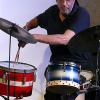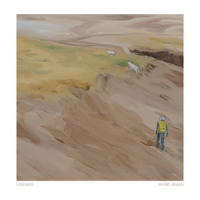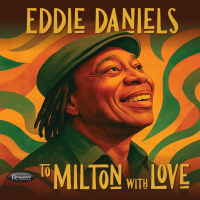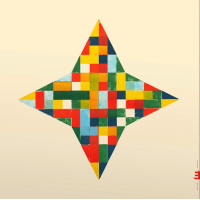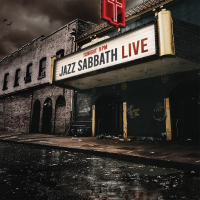Home » Jazz Articles » Album Review » William Parker: Migration of Silence Into and Out of the...
William Parker: Migration of Silence Into and Out of the Tone World
Seven of the ten albums are led by vocalists. Blue Limelight features Raina Sokolov-Gonzalez, a New York-based singer/composer whose style is bursting with color. Her emphatic interpretations of Parker's "A Great Day to be Dead" capture the bassist's wind-driven memories of childhood. "Jenny's Interlude" effectively renders the emotion of the Parker's never-performed opera, Becky Greybeard. The title track is a tribute to Cecil Taylor that was written the morning Taylor passed. Unlike Parker's 2 Blues For Cecil (TUM Records, 2022), with Andrew Cyrille and Enrico Rava, the references to the pianist are more direct and emotionally connected. Violinist Jason Kao Hwang joins with strings, oboe, and drums to form an eclectic ensemble; Parker relinquishes the bass role to Peter Dennis.
The second album, Child of Sound is a solo session featuring pianist/composer Eri Yamamoto. A Parker colleague for more than two decades, Yamamoto's disc is an outlier in the box set. It is nevertheless a superb session as Yamamoto takes on fourteen dedications in these compact Parker compositions. There are very appealing gospel-laced pieces such as "Malachi's Mode" and "The Golden Light"—the first for bassist Malachi Favors. "Malcolm's Smile" is dedicated to Malik el-Shabazz (Malcolm X) and "Mexico," to the Aztec people and a rebuke of U.S. policy under the Trump administration. Much of Child of Sound is focused on the plight of the native people of the Americas. "Trail of Tears II" is a particularly affecting piece. Yamamoto has recorded only one other solo piano album, Live In Benicassim (Blau Records, 2017). Released in Spain, it did not benefit from wide exposure. It's a shame that Yamamoto does not record more piano projects but, for now, Child of Sound is a reminder of how she excels as a soloist.
A haunting introduction opens The Majesty of Jah with (James) "Baldwin." The writer's spoken-word description of growing up in a hostile environment among "moral monsters" mixes with Parker's percussion and live electronics and Jalau-Kalvert Nelson's trumpet. It is an unnerving drawing of a culture that has changed too little. Improvisational singer Ellen Christi has been working with Parker for more than thirty years. On "Freedom," she contributes mostly wordless vocals to a piece that features Parker's spoken word recitation. Inside the protest-inspired piece are samples from Jemeel Moondoc, Kidd Jordan, Cooper-Moore, Dave Burrell, and other Parker colleagues.
Cheops contains some of the most complex music in the Migration Of Silence collection. New York-based Kyoko Kitamura is a vocal improviser who has worked with Joe Morris, Tomeka Reid, Taylor Ho Bynum and Anthony Braxton. The supporting cast here is more jazz-based with Matt Moran on vibes, Ben Stapp on tuba, saxophonist Kayla Milmine-Abbott and drummer Rachel Housle. Parker plays bass, bass duduk, and flute. Much of this disc is about texture, and in the many layers of pieces such as the title track, the layers of sound meld with Kitamura's various stylings. At times, her improvised singing is a combination of consonants and vowels, or whispers, and recitations in dramatic, poetic fashion. The twenty-two-minute "If We Play Soft Enough" creates a world within a song/poem. It combines noise, flute-enhanced vocal acrobatics, and complete silence.
Harlem Speaks features Hamid Drake on drums and frame drums, Parker adding guembri (bass lute), balafon and gralla (double-reeded woodwind) to the bass. The music is a rumination on Parker's parents and their affinity for the big bands that played the Savoy Ballroom during the Harlem Renaissance. While the sound only bears marginal resemblance to the era, its influence is palpable in its consistent swung rhythms.
Fay Victor supplies powerful and poignant vocals, sometimes in the form of scat singing or elegiac spoken tales. Victor has worked in jazz, blues, opera, and modern classical music. She has performed or recorded with Roswell Rudd, Anthony Braxton, Vijay Iyer, Tyshawn Sorey, Wadada Leo Smith, and many others. "Don't Sell My Soul" is a powerful standout track. The stripped-down trio moves in and out of decipherable motifs, constantly changing speeds with intensity and animation. For all its historical foundation, there is little nostalgia about Harlem Speaks.
Mexico native, singer, and multi-media artist Jean Carla Rodea heads an international line up on Mexico. U.S. saxophonist Jim Clouse, trumpeters Matt Lavelle and Matt Lambiase join musicians from the Middle East and North Africa for a set that reflects a global perspective. "Tilted Mirror," at just under a half-hour, is a showcase for the players Parker describes as "freedom fighters." The music moves through mesmerizing knots, Rodea reappearing in symbols and signals woven into dense layers of percussion. "It is for You" hums with energy, pushing toward chaos, repeatedly and collectively being recentered.
Poetry is one of many art forms for which Parker has an affinity. Afternoon Poem consists of sixteen Parker penned poems, performed acapella by Lisa Sokolov. An acclaimed experimental vocalist, she has appeared on three Parker recordings and worked with Gerry Hemingway, Cecil Taylor, Wayne Horvitz, Irene Schweizer, and many other jazz artists. Occasionally, as on "Rocket Man" and "Essence Calling Out," Sokolov's multi-tracked harmonies overlay her voice to create a chorus in the arrangement. The effect on the latter poem is striking. Many of the poems are short—one under twenty-five seconds. The last of these sixteen tracks, "Cloud and Sea Fading as Rain Falls" is the sole piece with instrumentation. Japanese pianist Yuko Fujiyama accompanies Sokolov's wordless vocal on this track that was originally recorded in 1993.
Lights in the Rain (The Italian Directors Suite) is an eclectic set, largely driven by the stunning vocal and spoken-word contributions of Andrea Wolper. She is accompanied by Parker on cornet and a supporting sextet. The ten compositions are a homage to the likes of Fellini, Leone, Roberto Rossellini, Vittorio De Sica, and other Italian cinema legends. Wolper's compelling readings shine on the ten-minute "Visconti," "Fellini," and the brief "Milano." The rich sound of the ensemble and the dynamic vocal expressions give the entire album a cinematic feeling.
Parker brings instruments of other cultures to much of his music. On The Fastest Train the keringot (traditional Penan nose flute), hochiku and shakuhachi (East Asian bamboo flute), the Native American Ojibway overtone bass flute, and Malakan flute, conch shell, a New Guinea flute (both played by Coen Aalberts), bamboo brushes, and more, add an authentic anthropological air to The Fastest Train. Klaas Hekman adds Dogon flute, additional shakuhachi, bass Indian flute, and piccolo. If the instrumentation was not enough of a spoiler, this music is deeply rooted in the cultures from which the flutes originated.
Jason Kao Hwang returns on Manzanar, as part of the Universal Tonality String Quartet. Manzanar, located between the Sierra Nevada and the Inyo mountains was originally land occupied by several indigenous tribes but became an internment camp for Japanese Americans during WWII. The area's tumultuous history is reflected in an unrestrained fusion of influences; classical, jazz, folk, and world music.
"Charcoal Paragraphs" and "Khaen" brim with tension bordering on chaos. Frenetic chamber music mixes with the spirit of the ancients and non-Western influences; so many identities that no one personality becomes clear to the listener. The twenty-one minute "On Being Native" includes Daniel Carter on alto saxophone and is linked to a poem inspired by the wildlife of Vermont.
There are loose concepts that tie the ten albums of Migration Of Silence Into And Out Of The Tone World together. In part, these collections are a reflection of the wealth and scope of Parker's artistic and social interests. Rising out of a South Bronx housing project, he became the foremost bassist in free jazz, and a philosopher, poet, Vision Festival entrepreneur, and ongoing student of world music. Another thread that runs through these albums is Parker's ongoing mission to give voice to the voiceless. He succeeds on this ambitious project which stands apart from category and convention. The box features four reproductions of Jo Wood-Brown oil paintings, a thirty-four-page booklet, and lyrics.
Track Listing
CD 1: Listen; Cosmic Funk; I’d Rather Be; A Great Day to Be Dead; Jenny’s Interlude; Blue Limelight (dedicated to Cecil Taylor); Bennie’s Tune; Recall; Kachina Song; All I Ever Want; Where the Angels Live; Old Tears.
CD 2: Malachi’s Mode; Malcolm’s Smile; This Sweet Land; The Golden Light (Hymn); Mexico; Broken Promises; Child of Sound; Sky Falling; Adobe House; Rez Sunset; Trail Of Tears I; Trail Of Tears II; Rez Sunrise; Ascending Earth.
CD 3: Baldwin; The Majesty of Jah; Freedom; Sun Song; Numbers; Letter to a Resurrected Slave Owner.
CD 4: Entire Universe; Cheops; The Map Is Precise; If We Play Soft Enough; Harriott.
CD 5: Dancing at the Savoy; Don’t Sell My Soul; Harlem Dances; Harlem Speaks; Paintings in the Sky; Shutters as Windows.
CD 6: Tilted Mirror; Mexico; The Bleeding Tree; It Is for You.
CD 7: Song to Lift Sadness (Morning); The Sky Is Always Beautiful; Morning Bird; Rocket Man; Essence Calling Out; Afternoon Poem; First Vision; Green and Brown; I Believe; I Will Die for You; Song for Patricia; My Cup; Silent Whispers; It Would Never Be Long Enough; Song to Lift Sadness (Evening); Cloud and Sea Fading as Rain Falls.
CD 8: Visconti; Fellini; Pasolini; Leone; De Sica; Rossellini; Gospel; Milano; Lights in the Rain; Antonioni.
CD 9: The Elders at the Edge of the World part 1; Cultivation; Deep Spirit; Family Voice; Listen to the Sky; Sacred Prayers; Host for the Anointed; Bamboo Village; Blessed; The Flute Reaches Out; The World’s Fastest Train; Joyous and Delightful; The Elders at the Edge of the World part 2.
CD 10: Charcoal Paragraphs; Khaen; Lakota Song; Manzanar; On Being Native.
Personnel
William Parker
bassMara Rosenbloom
pianoEri Yamamoto
pianoIllay Sabag
pianoHamid Drake
drumsDaniel Carter
saxophoneMatt Lavelle
trumpetKyoko Kitamura
vocalsFay Victor
vocalsLisa Sokolov
vocalsMatt Moran
vibraphoneJason Kao Hwang
composer / conductorKayla Milmine
saxophone, sopranoAndrea Wolper
vocalsNicole Federici
violaGwen Laster
violinMatt Lambiase
flugelhornDara Bloom
celloMelanie Dyer
violaEllen Christi
vocalsOhad Kapuya
bassPeter Dennis
bassCoen Aalberts
fluteJackson Krall
drumsRachel Housle
drumsKevin Murray
drumsJean Carla Rodea
vocalsRaina Sokolov-Gonzalez
vocalsKlaas Hekman
fluteJim Clouse
drumsAdditional Instrumentation
William Parker: bass, donso ngoni, percussion, voice, bass duduk, fujara overtone flute, guembri, balafon, gralla, serbian flute, kamele ngoni, cornet, keringot, hochiku, shakuhachi, stereophonic bamboo flute, ojibway overtone bass flute, pocket trumpet, malakan flute, chinese shakuhachi, khaen, navajo flute, fujara overtone flute; Peter Dennis: bass; Scot Moore: violin; Reina Murooka: violin; Raina Sokolov-Gonzalez: voice; Tina Burova: violin; Jim Ferraiuolo: oboe; Kevin Murray: drums; Jim Clouse: drums, tenor sax; Ellen Christi: sampling, production; Jalalu-Kalvert Nelson: trumpet; Ben Stapp: tuba; Rachel Housle: drums; Hamid Drake: frame drum; Jean Carla Rodea: voice; Brahim Fribgane: oud; Jackson Krall: tenor drum; Ariel Bart: harmonica; Ohad Kapuya: bass; Kevin Murray: drums & percussion; Coen Aalberts: conch shell, winti flute from New Guinea, cricket sounds, bird sounds, bamboo brushes, whistles, drum set; Klaas Hekman: dogon flute, shakuhachi, bass Indian flute, piccolo and C flute; Jean Cook: violin; Alexander Waterman: cello.
Album information
Title: Migration of Silence Into and Out of the Tone World | Year Released: 2021 | Record Label: Centering Records
Tags
PREVIOUS / NEXT
William Parker Concerts
Support All About Jazz
 All About Jazz has been a pillar of jazz since 1995, championing it as an art form and, more importantly, supporting the musicians who make it. Our enduring commitment has made "AAJ" one of the most culturally important websites of its kind, read by hundreds of thousands of fans, musicians and industry figures every month.
All About Jazz has been a pillar of jazz since 1995, championing it as an art form and, more importantly, supporting the musicians who make it. Our enduring commitment has made "AAJ" one of the most culturally important websites of its kind, read by hundreds of thousands of fans, musicians and industry figures every month.




















